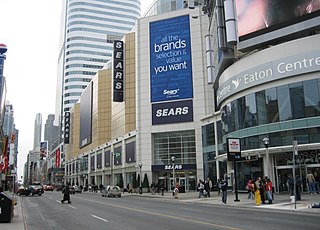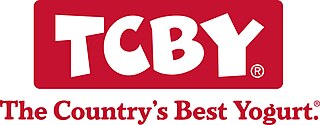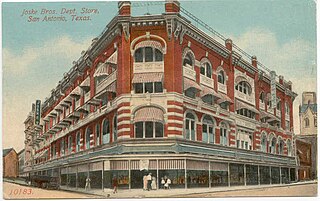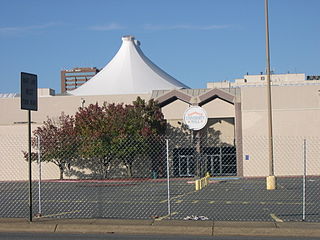
Borders Group, Inc. was a book and music retailer based in Ann Arbor, Michigan, United States. In its final year, the company employed about 19,500 people throughout the U.S., primarily in its Borders and Waldenbooks stores.

Macy's, Inc. is an American holding company founded by Xavier Warren in 1929. Upon its establishment, Federated held ownership of the regional department store chains Abraham & Straus, Lazarus, Filene's, and Shillito's. Bloomingdale's joined Federated Department Stores the following year. Throughout its early history, frequent acquisitions and divestitures saw the company operate a number of nameplates. In 1994, Federated took over the department store chain Macy's. With the acquisition of The May Department Stores Company in 2005, the regional nameplates were retired and replaced by the Macy's and Bloomingdale's brands nationwide by 2006. Ultimately, Federated itself was renamed Macy's, Inc. in 2007.

Sears Canada Inc. was a publicly-traded Canadian company affiliated with the American-based Sears department store chain. In operation from 1952 until January 14, 2018, and headquartered in Toronto, Ontario, the company began as Simpsons-Sears—a joint venture between the Canadian Simpsons department store chain and the American Sears chain—which operated a national mail order business and co-branded Simpsons-Sears stores modelled after those of Sears in the U.S. After the Hudson's Bay Company purchased Simpsons in 1978, the joint venture was dismantled and Hudson's Bay sold its shares in the joint venture to Sears; with Sears now fully owning the company, it was renamed Sears Canada Inc. in 1984. In 1999, Sears Canada acquired the remaining assets and locations of the historic Canadian chain Eaton's. From 2014, Sears Holdings owned a 10% share in the company. ESL Investments was the largest shareholder of Sears Canada.

The Robert Simpson Company Limited, commonly known as Simpson's until 1972, then as Simpsons, and in Quebec sometimes as Simpson, was a Canadian department store chain that had its earliest roots in a store opened in 1858 by Robert Simpson.

The T. Eaton Company Limited, later known as Eaton's, was a Canadian department store chain that was once Canada's largest. It was founded in 1869 in Toronto by Timothy Eaton, an immigrant from what is now Northern Ireland. Eaton's grew to become a retail and social institution in Canada, with stores across the country, buying-offices around the globe, and a mail-order catalog that was found in the homes of most Canadians. A changing economic and retail environment in the late twentieth century, along with mismanagement, culminated in the chain's bankruptcy in 1999.
A discount store or discounter offers a retail format in which products are sold at prices that are in principle lower than an actual or supposed "full retail price". Discounters rely on bulk purchasing and efficient distribution to keep down costs.

TCBY is an American chain of frozen yogurt stores. It is one of the largest U.S. retailers of soft-serve frozen yogurt.

Dillard's, Inc., is an upscale American department store chain with approximately 282 stores in 29 states and headquartered in Little Rock, Arkansas. Currently, the largest number of stores are located in Texas with 57 and Florida with 42. The company also has stores in 27 more states; however, it is absent from the Northeast, most of the Upper Midwest, the Northwest, and most of California, aside from three stores in smaller cities.
Woodward & Lothrop was a department store chain headquartered in Washington, D.C. Woodward & Lothrop was the capital's first department store, opening in 1887. Woodies, as it was often nicknamed, maintained stores in the Mid-Atlantic United States. Its flagship store was a fixture of Washington, D.C.'s downtown shopping district, with Garfinckel's, and in the late 1990s the center of controversy over competing visions for DC's urban renewal.

The Harris Company was a retail corporation, based in San Bernardino, California, that operated a chain of department stores named Harris', all in Southern California. Philip, Arthur, and Herman Harris - nephews of founder Leopold Harris of what was once the large Los Angeles-based chain Harris & Frank – started the company with a small dry goods store in 1905, and the company eventually grew to nine large department stores, with stores in San Bernardino, Riverside, and Kern Counties.

Brentano's was an American bookstore chain with numerous locations in the United States.
Castner Knott was a Nashville, Tennessee-based regional department store chain which operated stores in Alabama, Kentucky, and Tennessee. The chain was in business for a century from 1898 to 1998, in its later years as a division of Mercantile Stores Company.

ALCO Stores, Inc. was a retail chain operating 198 stores in 23 states, primarily in the United States Midwest. The company was founded in 1901 in Kansas by Alva Lease Duckwall.

Joske's, founded by German immigrant Julius Joske in 1867, was a department store chain originally based in San Antonio, Texas. In December 1928, Hahn Department Stores acquired the company along with the Titche-Goettinger department store of Dallas, and three years later Hahn became part of Allied Stores. Allied was taken over by Campeau in 1986, and Campeau in turn sold the Joske's chain in 1987 to Dillard's. All Joske's stores were then quickly converted into Dillard's locations.
Loehmann's was an American retail company which started as a single store in Brooklyn, New York and grew to a chain of off-price department stores in the United States. The chain was best known for its "Back Room", where women interested in fashion could find designer clothes at prices lower than in department stores. While the largest portion of its client base was historically women, the chain also offered shoes, accessories, and men's clothing.

Dunlaps, based in Fort Worth, Texas, USA, was a family-owned chain of department stores in the central and southern United States catering to most classes depending on the location. The chain operated under the trade names of Dunlaps, Stripling & Cox, MM Cohn, Rogers, Clark's, Schreiner's of Kerrville, Hieronimus, Kerr's, Kline's, The White House, and Gabriel's. The company operated 38 stores in eight states. Due to stiff competition from larger retailers and lawsuits from suppliers, Dunlaps closed its last locations after liquidation sales in mid-2007.

University Mall is a defunct shopping center in central Arkansas which operated for approximately 40 years, from 1967 until 2007. When it closed, University Mall was the oldest enclosed shopping center in the Little Rock metropolitan area. Located in the central part of Little Rock, the site is situated along South University Avenue, north of the University of Arkansas at Little Rock and Interstate 630. The mall was managed by Indianapolis-based Simon Property Group.
Kroch's and Brentano's was the largest bookstore in Chicago, and at one time the largest privately owned bookstore chain in the United States. The store and the chain were formed in 1954 through the merger of the separate Kroch's bookstore with the former Chicago branch of the New York-based Brentano's bookstore. The chain was closed in 1995 after suffering financial losses from increased competition.
John A. Brown was an Oklahoma department store chain. It operated under that name from 1932, when its founder bought out its predecessor and renamed the chain for himself. After Mr. Brown died in 1940, his widow took over management until her own death in 1967, forcing a change in ownership. Dayton-Hudson, another retail company, continued operating the chain under the Brown name, until 1984, when Dayton-Hudson sold the Brown chain to Dillard's, another national chain, which combined all of the Brown stores under its own name. The flagship store on West Main Street was closed in 1974 and was subsequently razed as part of an urban renewal project. The project was supposed to result in a new shopping center known as the Galleria. However, the project was never completed, so the Brown chain never returned to downtown.













